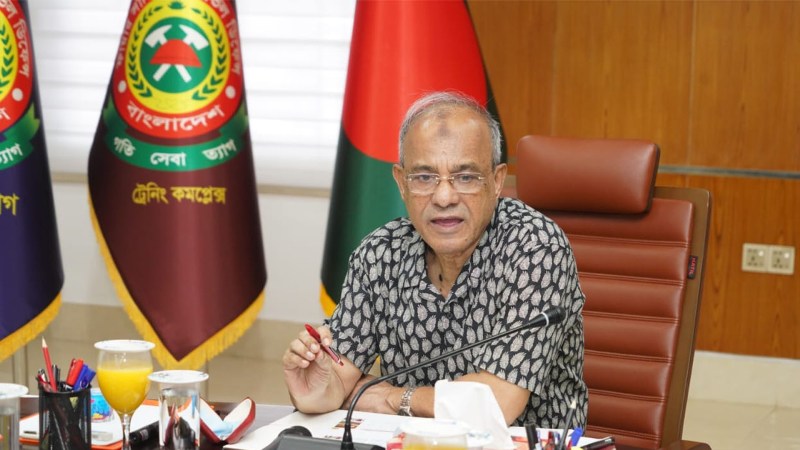Bangladesh’s Home Ministry advisor Lieutenant General (retd) Jahangir Alam Chowdhury has either gone cuckoo or lost control in the face of countrywide lawlessness, disorder and chaos.
One instance of Chowdhury going bananas occurred last night when, suddenly, he announced holding a press briefing. The time fixed for this interaction with the media was set for 3 am. And even before his address to the media went underway, anti-social elements were having a field day as they robbed and looted in the streets of Dhaka. At least three videos of such incidents were on social media in the dead of night.
But Chowdhury was hellbent on proving that he had lost his marbles. He thundered into the mike that Awami League supporters were behind the lawlessness that has gripped Bangladesh for several months now. He swore that the situation would improve “from tomorrow” as he had ordered the police to intensify patrolling and apprehend the Awami League supporters.
This was a political statement, which did not reflect an official in charge of the situation made worse by the students’ coordinators who are a law unto themselves and who, at the drop of a hat, spout a range of rhetoric.
On his part, the Press advisor to Yunus made himself a laughing stock this morning when he said the law and order situation was at its best. The reality, however, is alarming: in a report, Deutsche Welle said there were 320, 298, 345, 275, 360, 382 and 310 murders in August, September, October, November, December (of 2024) and January and February (of 2025), respectively. The same period also recorded high levels of incidents of rapes and dacoities.
This led Dhaka-based political analyst Nazmul Ahsan Kalimullah to say that “it is unprecedented in Bangladesh’s history that any government of the day found time to hold a press briefing at 3 in the morning. Lawlessness prevails across Bangladesh and this is a reflection of the interim regime’s loss of control”.
Clearly, Chowdhury’s diatribe reveals a degree of bankruptcy of ideas when he should know that ‘Operation Devil Hunt’, aimed at arresting people suspected of trouble-making, was still on. Either ‘Operation Devil Hunt’ has not achieved its stated objective or the law enforcement machinery itself is in a state of disarray.
Chowdhury was appointed Home Ministry advisor in the Mohammad Yunus-led interim authority in August 2024. At that time, he replaced Brigadier (retd) Shakhwat Hossain who lost that office as a consequence of an observation related to the mysterious entry into Dhaka of prohibited bore bullets used during the July-August students-led violent agitation that forced then Prime Minister Sheikh Hasina to flee Bangladesh.
Since then, Bangladesh has been gripped in political and economic uncertainty with Yunus’ team of advisors either unable or unwilling to act in ways that could steady the rocking ship. The “worst performer”, so to say, has been Chowdhury who holds a critical portfolio that includes overseeing the functioning of the police – a critical component in a post-Hasina environment – which has failed to restore law and order in a country beset with political and social violence.
Meanwhile, US President Donald Trump’s recent comments that $29 million was given as a grant (through the controversial USAID) ostensibly for political reforms has set the cat among the pigeons in Bangladesh. Political analysts there have been trying to uncover a “little known firm” (as claimed by Trump) that was the recipient of the money, in part or in whole, and which may have been funneled into the students’ movement that ejected Hasina out of power.
However, documents accessed by Northeast News suggest that three Bangladeshi entities – a Bengali newspaper, a digital marketing company and a “volunteer-driven development organisation” – were recipients of the $29 million continuing grant.
While Trump may be excused for not being fully informed about which specific organisation received the money, or a part of it, inquiries by Northeast News in Dhaka indicate that a key advisor to the interim regime, with previous experience, in the NGO sector, may have benefitted, through links with the Bengali newspaper’s proprietors.
This gives rise to several unanswered questions, the primary being whether some part of the money was diverted to finance the students’ movement through the direct or indirect involvement of the advisor in question. This, in turn, leads to the question whether other key advisors in the interim authority were aware of the transfer of the American money and which other students’ bodies or Islamist organisations were recipients of such largesse.
The Yunus-led interim authority has been wholly non-transparent in its approach to the functioning of individual ministries and government agencies. There are allegations that some of the main students’ coordinators may have amassed huge wealth since August 2024. Besides, and certainly more worrisome, there is disquiet in Dhaka and New Delhi over the release from prison of terrorist elements who could cause trouble in India’s West Bengal and the northeast.
ALSO READ: BSF may back off on contentious single-row fencing issue along India-Bangladesh border
While Chowdhury appears to have lost control, especially in the midst of rising and unchecked levels of crime, the deteriorating law and order situation and the politics of vengeance, any mishandling of the situation could only contribute to the downward spiral in Bangladesh. This will certainly not bode well for Bangladesh and unleash forces that may pose a challenge to Indian security.















